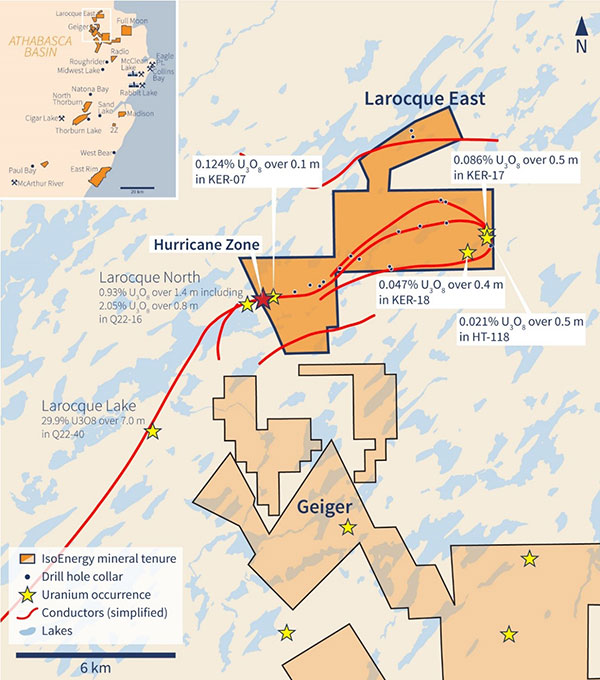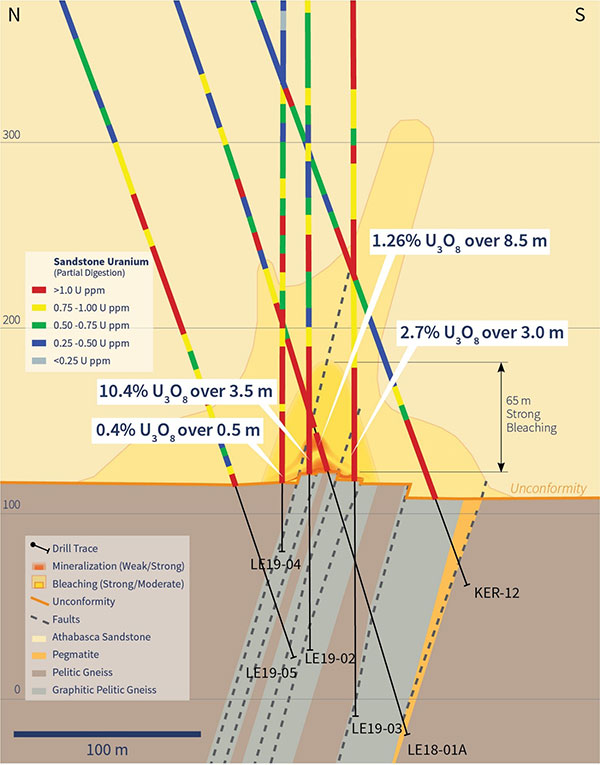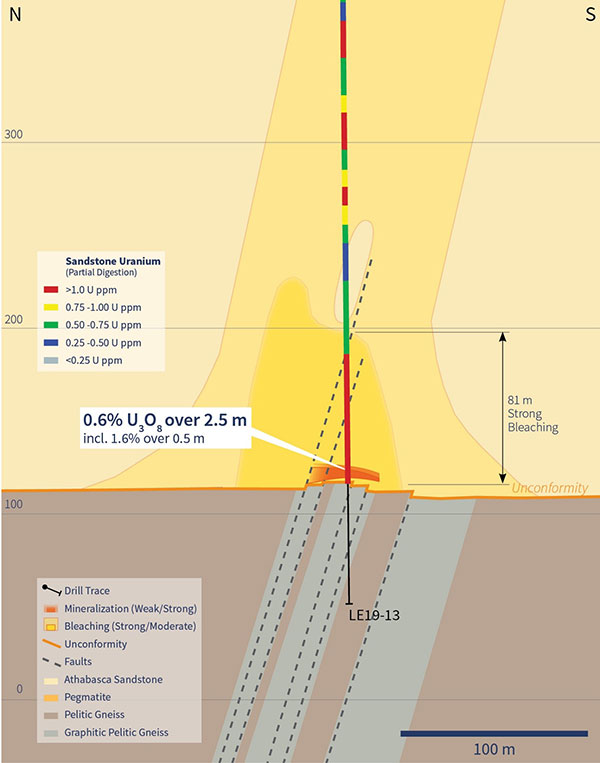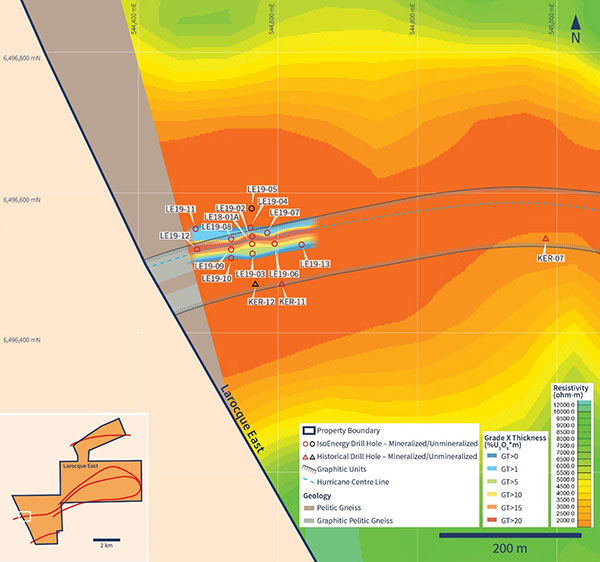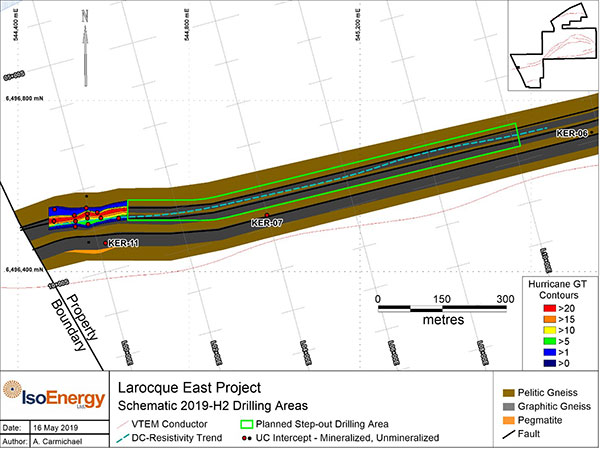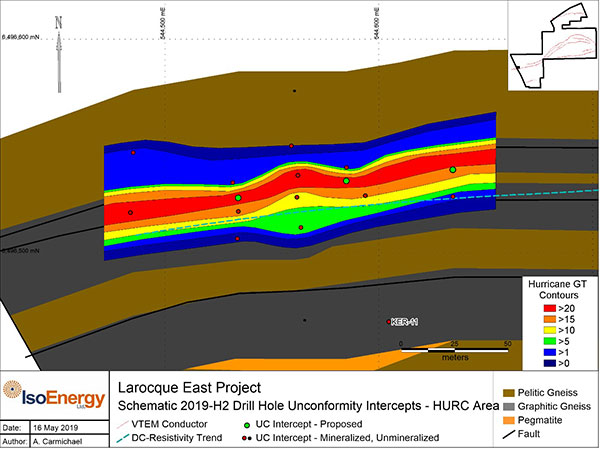IsoEnergy Targets Eastern Strike Extension of Hurricane Uranium Zone
May 29, 2019Vancouver, BC, May 29, 2019 – IsoEnergy Ltd. (“IsoEnergy” or the “Company”) (TSXV: ISO; OTCQX: ISENF) is pleased to announce its targeting strategy for the upcoming Summer 2019 Hurricane Extension drilling program on its 100% owned Larocque East property (the “Property”). The primary objective of the drilling will be to evaluate the potential for expansion of the Hurricane zone east of the current drilling pattern. Targets have been generated from integrated interpretations of geology, trace element geochemistry, alteration patterns and preliminary results from a 53 line-km program of DC-Resistivity (DC-Res) geophysical surveying that is still underway. The Hurricane zone is a new discovery of high-grade uranium mineralization located in the prolific eastern Athabasca basin, Saskatchewan.
Based on the Company’s recently completed winter drilling program, the Hurricane zone is a body of shallow (330m below surface), high-grade uranium mineralization located on the west side of the Larocque East property (Figure 1). Eleven of 12 drill holes in the winter campaign intersected significant uranium mineralization. Hurricane now measures 150m (long) x 38m (wide) and is up to 8.5m thick. The zone is open on all five sections drilled to date and along-strike in both directions. The Company, having raised $5.5 million in December 2018, remains fully funded for a follow-up drilling campaign that is expected to begin in late June.
Steve Blower, Vice President, Exploration commented: “Compilation of our drilling data and integration with results from our geophysical surveying program has given us a clear path forward for our rapidly approaching summer drilling program. Increasing sandstone alteration to the east combined with robust trace element geochemistry in the easternmost drill hole confirms the highly prospective nature of the eastern strike extension of Hurricane. Further, our new geophysical survey results support the premise that historical mineralized drill hole KER-07, located 345m to the east, was drilled 100m south of the target horizon.”
Craig Parry, Chief Executive Officer commented: “I’m excited about the potential for expansion of the Hurricane zone along-strike to the east of our current drilling pattern. With the planned resumption of drilling in late June, upcoming releases of Hurricane drill results should coincide with improving uranium market conditions expected in the near term.”
Summer Drilling Targeting Strategy
Five main features, as described below, suggest a strong probability that the Hurricane mineralization extends east of the easternmost drill hole at Hurricane, LE19-13.
Mineralization is Open
Drill hole LE19-13 intersected substantial uranium mineralization (0.6% U3O8 over 2.5m) but was likely drilled south of the optimal location on the trend, based on oriented core measurements and ISO’s interpretation of the basement geology.
Trace Element Geochemistry
Strong sandstone uranium and uranium pathfinder geochemistry is present on the easternmost section. Figures 2 and 3 compare sandstone uranium geochemistry on the discovery section with the easternmost section drilled. Anomalous uranium values (>1ppm U) extend to the top of the sandstone on both sections.
Sandstone Alteration
The volume and tenor of sandstone bleaching increases toward the east. Moderate and intense sandstone bleaching polygons are shown on Figures 2 and 3 and they demonstrate that the sandstone bleaching is becoming stronger and more voluminous to the east. Strong bleaching on the discovery section extends 65m above the unconformity and it extends 25% higher (81m) on the easternmost section.
Sandstone Clay Mineralogy
Clays in the sandstone above the Hurricane zone are dominantly illitic, a feature commonly associated with large uranium deposits in the Athabasca basin. Historical mineralized drill hole KER-07, 345m east of the Hurricane zone, also intersected sandstone with strongly illitic clays throughout much of the column.
New Geophysical Results
New geophysical results from the Company’s ongoing DC-Resistivity survey confirm that KER-07 was drilled south of the target basement horizon. Figure 4 shows preliminary results of the survey over the eastern strike extension area. Historical drill hole KER-07 was drilled on the southern margin of the relatively wide conductive package, approximately 70m south of the relative position of the Hurricane zone, which is located in the center of the conductive package.
Drilling Plans
Sixteen drill holes totalling 6,700m are planned for the upcoming summer drilling season at Larocque East. Based on the features described above, 13 of the 16 drill holes will target the eastern strike extension of the zone in the area marked on Figure 5. They will be drilled as a series of two to three hole fences spaced 100-200 metres apart and will evaluate a total additional strike length of 900 metres. The remaining three drill holes will evaluate the potential for thicker and higher-grade zones within the current drilling pattern as marked on Figure 6. Drilling is expected to resume at Hurricane in late June
Larocque East
Larocque East consists of 6 mineral claims totaling 3,200 hectares and was purchased in May, 2018. The Property is owned 100% by IsoEnergy and is not encumbered by any royalties or other interests. Larocque East is immediately adjacent to the north end of IsoEnergy’s Geiger property and is 35 kilometres northwest of Orano Canada’s McClean Lake uranium mine and mill.
The Property covers a 15-kilometre-long northeast extension of the Larocque Lake conductor system; a trend of graphitic metasedimentary basement rocks that is associated with significant uranium mineralization at the Hurricane zone, and in several occurrences on a neighbouring property to the southwest of Larocque East. The closest of these to Larocque East are the Larocque Lake and Larocque North zones, which are located 6.5 kilometres and 0.4 kilometres, respectively, to the southwest of the western Larocque East property boundary. Drilling at Cameco Corp.’s Larocque Lake zone has returned historical intersections of up to 29.9% U3O8 over 7.0 metres in drill hole Q22-040. Drilling at the Larocque North zone has returned intersections of up to 2.05% U3O8 over 0.6 metres in drill hole Q22-16. Like the nearby Geiger property, Larocque East is located adjacent to the Wollaston-Mudjatik transition zone - a major crustal suture related to most of the major uranium deposits in the eastern Athabasca Basin. Importantly, the sandstone cover on Larocque East is thin, ranging between 140 metres and 330 metres in previous drilling.
In addition to the Hurricane zone discovery, four historical drill holes have intersected weak uranium mineralization at other locations on the Larocque East property to date.
Figure 1 – Larocque East Property Location Map
Figure 2 – Sandstone Uranium Geochemistry and Alteration on section 4560E (the Discovery Section)
Figure 3 – Sandstone Uranium Geochemistry and Alteration on section 4635E (the Easternmost Section)
Figure 4 – Preliminary DC-Resistivity Results (100mASL Planview)
Figure 5 – Planned Drilling Area for the Summer 2019 Eastern Extension Drillholes
Figure 6 – Planned Drill Holes Within the Current Hurricane Zone Footprint
Qualified Person Statement
The scientific and technical information contained in this news release was prepared by Andy Carmichael, P.Geo., IsoEnergy’s Senior Geologist, who is a “qualified person” (as defined in National Instrument 43-101 – Standards of Disclosure for Mineral Projects). Mr. Carmichael has verified the data disclosed. This news release refers to properties other than those in which the Company has an interest. Mineralization on those other properties is not necessarily indicative of mineralization on the Company’s properties. An RS-125 hand-held spectrometer was used to verify that the radioactivity is due to uranium. As the drill holes reported herein are vertical or near-vertical, and the mineralization is interpreted to be horizontal, the true thickness is expected to be within 90% of the cored intervals.
About IsoEnergy
IsoEnergy is a well-funded uranium exploration and development company with a portfolio of prospective projects in the eastern Athabasca Basin in Saskatchewan, Canada and a historic inferred mineral resource estimate at the Mountain Lake uranium deposit in Nunavut. IsoEnergy is led by a Board and Management team with a track record of success in uranium exploration, development and operations. The Company was founded and is supported by the team at its major shareholder, NexGen Energy Ltd.
Craig Parry
Chief Executive Officer
IsoEnergy Ltd.
+1 778 379 3211
cparry@isoenergy.ca www.isoenergy.ca
Investor Relations
Kin Communications
+1 604 684 6730
iso@kincommunications.com
www.isoenergy.ca
Neither the TSX Venture Exchange nor its Regulations Services Provider (as that term is defined in the policies of the TSX Venture Exchange) accepts responsibility for the adequacy or accuracy of this release.
This news release shall not constitute an offer to sell or a solicitation of any offer to buy any securities, nor shall there be any sale of any securities in any jurisdiction in which such offer, solicitation or sale would be unlawful. The securities referenced herein have not been, nor will they be, registered under the United States Securities Act of 1933, as amended (the “U.S. Securities Act”), and such securities may not be offered or sold within the United States absent registration under the U.S. Securities Act or an applicable exemption from the registration requirements thereunder.
Forward-Looking Information
The information contained herein contains “forward-looking statements” within the meaning of the United States Private Securities Litigation Reform Act of 1995 and “forward-looking information” within the meaning of applicable Canadian securities legislation. “Forward-looking information” includes, but is not limited to, statements with respect to the activities, events or developments that the Company expects or anticipates will or may occur in the future, including, without limitation, planned exploration activities. Generally, but not always, forward-looking information and statements can be identified by the use of words such as “plans”, “expects”, “is expected”, “budget”, “scheduled”, “estimates”, “forecasts”, “intends”, “anticipates”, or “believes” or the negative connotation thereof or variations of such words and phrases or state that certain actions, events or results “may”, “could”, “would”, “might” or “will be taken”, “occur” or “be achieved” or the negative connotation thereof.
Such forward-looking information and statements are based on numerous assumptions, including among others, that the results of planned exploration activities are as anticipated, the price of uranium, the anticipated cost of planned exploration activities, that general business and economic conditions will not change in a material adverse manner, that financing will be available if and when needed and on reasonable terms, that third party contractors, equipment and supplies and governmental and other approvals required to conduct the Company’s planned exploration activities will be available on reasonable terms and in a timely manner. Although the assumptions made by the Company in providing forward-looking information or making forward-looking statements are considered reasonable by management at the time, there can be no assurance that such assumptions will prove to be accurate.
Forward-looking information and statements also involve known and unknown risks and uncertainties and other factors, which may cause actual events or results in future periods to differ materially from any projections of future events or results expressed or implied by such forward-looking information or statements, including, among others: negative operating cash flow and dependence on third party financing, uncertainty of additional financing, no known mineral reserves or resources, the limited operating history of the Company, the influence of a large shareholder, alternative sources of energy and uranium prices, aboriginal title and consultation issues, reliance on key management and other personnel, actual results of exploration activities being different than anticipated, changes in exploration programs based upon results, availability of third party contractors, availability of equipment and supplies, failure of equipment to operate as anticipated; accidents, effects of weather and other natural phenomena and other risks associated with the mineral exploration industry, environmental risks, changes in laws and regulations, community relations and delays in obtaining governmental or other approvals.
Although the Company has attempted to identify important factors that could cause actual results to differ materially from those contained in the forward-looking information or implied by forward-looking information, there may be other factors that cause results not to be as anticipated, estimated or intended. There can be no assurance that forward-looking information and statements will prove to be accurate, as actual results and future events could differ materially from those anticipated, estimated or intended. Accordingly, readers should not place undue reliance on forward-looking statements or information. The Company undertakes no obligation to update or reissue forward-looking information as a result of new information or events except as required by applicable securities laws

